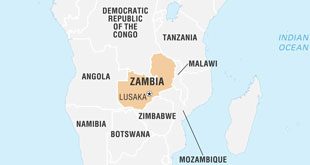
Bangkok, Thailand | AFP | As doctors scramble to contain the fast-spreading coronavirus, a potent brew of anti-retroviral and flu drugs has emerged as a possible defence against the mysterious sickness that has killed hundreds.
But the science is inconclusive on whether they are actually effective and experts say successful treatment could take years.
Here is what we know — and don’t know — about the drugs deployed against the SARS-like virus.
– Why anti-retrovirals? –
Patients diagnosed with the common flu are often prescribed an antiviral drug widely known as Tamiflu.
But the seasonal flu is “very different from the Chinese coronavirus”, said Sylvie van der Werf at the Paris-based Pasteur Institute.
So far, the new coronavirus has infected tens of thousands worldwide and killed more than 420 people mostly in mainland China.
Two weeks ago Chinese doctors confirmed they had been giving anti-HIV drugs to coronavirus patients in Beijing, based on a 2004 study during the outbreak of Severe Acute Respiratory Syndrome, or SARS, that showed “favourable” responses.
Used together, lopinavir and ritonavir decrease the amount of HIV cells in a patient’s blood, stripping back the virus’s ability to reproduce and attack the immune system.
Doctors have also combined the treatment with another anti-flu drug called oseltamivir, hoping the creative cocktail can sap the new coronavirus of its strength.
In Thailand, where there are 19 confirmed cases, a 71-year-old Chinese patient returned a negative test within 48 hours of being given the three drugs.
But Thai doctors cautioned the medicine needed to be given under supervision due to possible side effects or it clashing with pre-existing medications.
– Does it actually work? –
In short, we don’t know for sure.
The 2004 study showed anti-retrovirals used on patients with SARS had “substantial clinical benefits”, experts in China said.
But random trials on 41 coronavirus patients had “limitations”, according to the research, which was published in medical journal The Lancet on January 24.
The researchers were not able to obtain complete samples from the patients’ lower respiratory tract — which is suspected to be the target site of the new coronavirus — and there were not enough patients to verify results.
“Further studies in outpatient, primary care, or community settings are needed to get a full picture,” they wrote.
– What’s big pharma doing? –
Biotech firms are working on a suite of treatment options.
California-based Gilead Sciences said they are working with Chinese authorities on clinical trials to determine if remdesivir — a drug used to treat SARS — is effective against the new coronavirus.
Meanwhile three teams around the world — in China, Australia and the Pasteur Institute in France — have now succeeded in cultivating the new coronavirus in the laboratory.
That could lead to pinpointing its “Achilles’ heel” by understanding how it replicates in cells, said Christophe d’Enfert, the institute’s scientific director.
But as of now there is no specific treatment against it, World Health Organization spokesperson Tarik Jasarevic said.
“More investigations and analysis of the epidemiological data is still required,” he told AFP.
– So what should you do? –
The best approach for the general public is to try and “stay healthy” so your immune system can offer a robust response to the threat of the virus, said Singapore’s health minister Gan Kim Yong.
But for already infected patients, hospitals must provide supportive care to prevent complications.
“Chances are if you already have underlying medical conditions… your defences are weak and your organs may already be impaired, and therefore the risk of death is higher,” he told parliament Monday.
Developing a successful solution may take months or years, he added.
– Home remedies and quackery –
But misinformation has proliferated online about home and traditional remedies.
A liquid made with honeysuckle and flowering plants used in traditional medicine was initially claimed to “inhibit” the virus, sparking frenzied buying in China.
But Chinese state media later sounded a more cautionary note, as researchers warned of potential side effects from the medicine.
In India, where there are three reported confirmed cases, the government has touted ancient homeopathy and Ayurveda remedies as the answer.
The jury is out on the effectiveness, and doctors still recommended that patients be treated in a hospital.
Online posts erroneously identified saline — basic salt water — as a coronavirus killer in Australia, while in Thailand social media touted that an antiseptic should be sprayed in a person’s mouth.
The antiseptic company Betadine has refuted the claim.
 The Independent Uganda: You get the Truth we Pay the Price
The Independent Uganda: You get the Truth we Pay the Price


